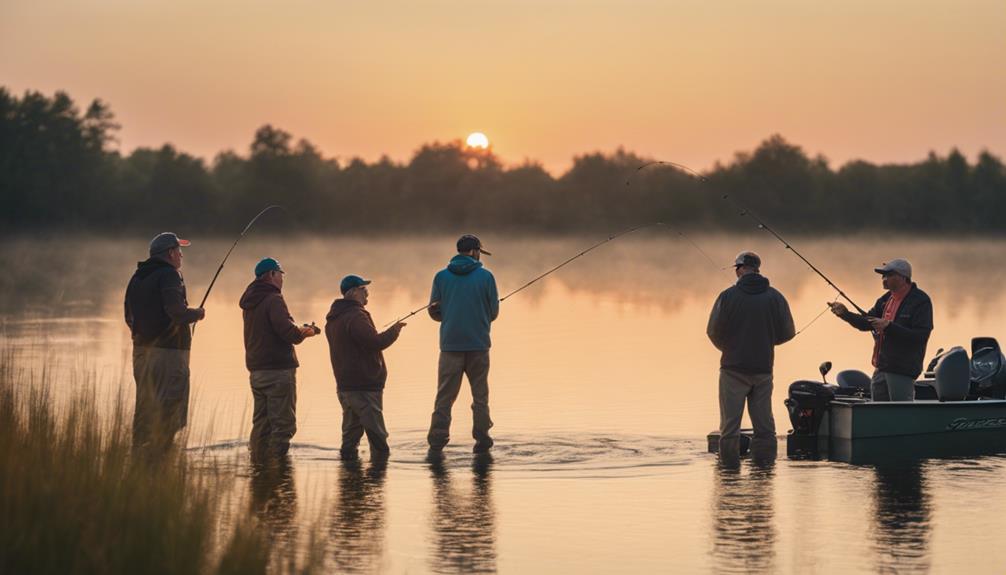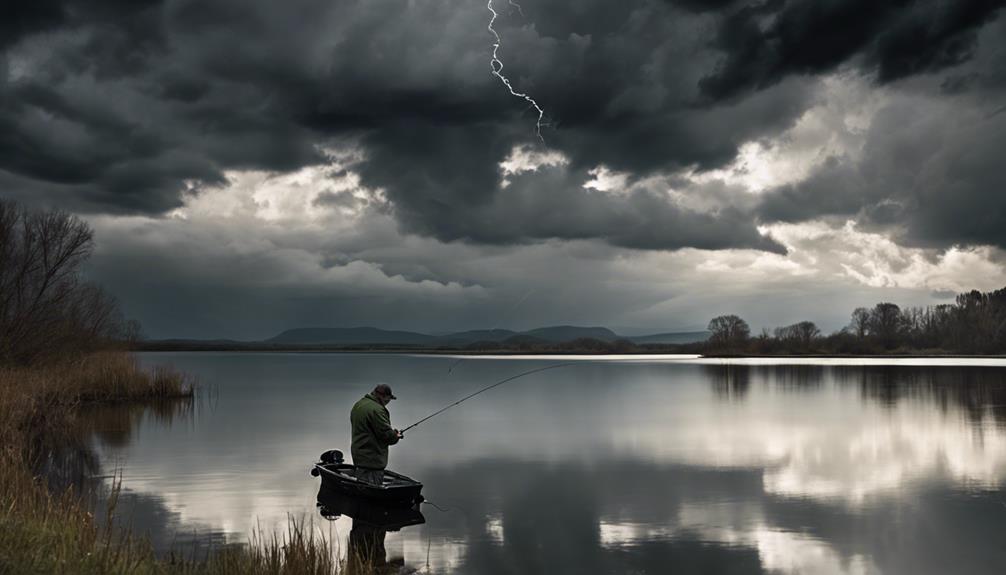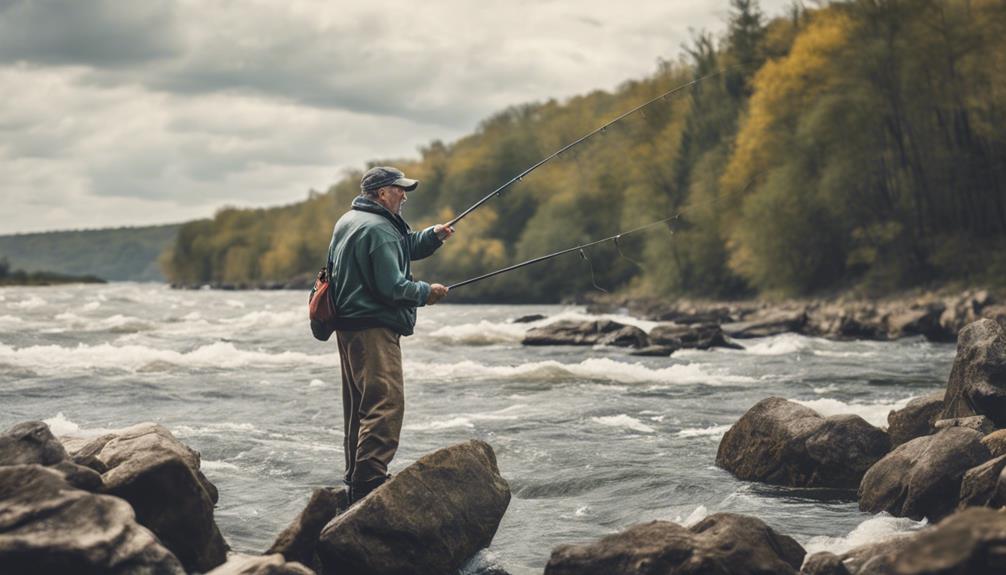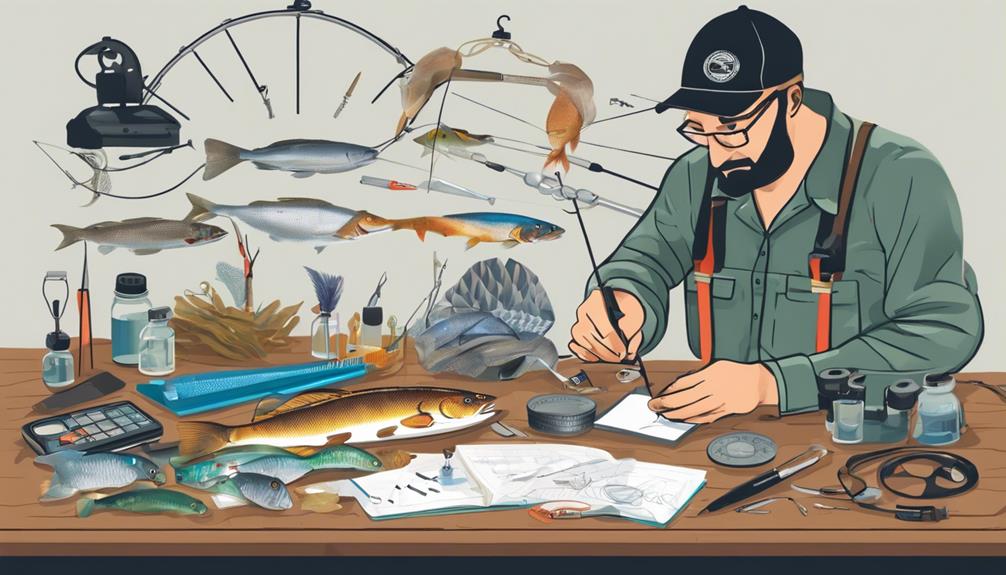Mastering the subtle art of competitive angling coaching demands dedication and finesse. From understanding angler psychology to promoting sportsmanship and ethics, these nine tips are essential for your coaching success.
But what truly sets the best coaches apart is their ability to weave these tips seamlessly into their coaching philosophy, creating a winning formula that propels their anglers to the top of the leaderboard.
Are you ready to elevate your coaching game and lead your team to victory in the competitive angling arena?
Understanding Angler Psychology
Have you ever wondered why some anglers excel under pressure while others struggle to perform their best? The key lies in understanding the performance mindset and psychological factors that influence angler behavior on the water. A strong performance mindset is essential for competitive anglers as it helps them stay focused, confident, and resilient in the face of challenges.
Psychological factors play a significant role in angler performance, with aspects such as confidence, motivation, and mental toughness impacting how well an angler can handle the pressures of competition. Anglers with a positive mindset are more likely to set challenging goals, persist in the face of setbacks, and remain composed under stress. On the other hand, anglers who struggle with negative thinking or self-doubt may find it challenging to perform at their best when the stakes are high.
To help anglers excel in competitive fishing, coaches must work on developing their mental skills alongside their technical abilities. This can involve strategies such as goal setting, visualization, positive self-talk, and relaxation techniques to help anglers manage their emotions and maintain focus during tournaments. By understanding the performance mindset and addressing psychological factors, coaches can empower their anglers to perform at their peak when it matters most.
Developing Customized Training Plans
To effectively enhance angler performance, crafting tailored training plans is essential for coaches in the realm of competitive angling. Individualized instruction is crucial in developing these plans. Begin by conducting a comprehensive skill assessment for each angler. This assessment should cover various aspects such as casting accuracy, knowledge of different fishing techniques, boat handling skills, and ability to adapt to different weather conditions.
Once you have identified the strengths and weaknesses of each angler, you can then proceed to design customized training plans that focus on improving specific areas. For example, if an angler struggles with casting accuracy, you can incorporate drills and exercises that target precision and distance. Similarly, if an angler needs to enhance their boat handling skills, you can plan training sessions that simulate challenging scenarios on the water.
It's essential to regularly monitor the progress of each angler and adjust the training plans accordingly. Providing feedback and guidance throughout the training process is key to ensuring continuous improvement. Remember, the goal of these customized training plans is to help each angler reach their full potential and excel in competitive angling. By prioritizing individualized instruction and skill assessment, you can effectively elevate the performance of your anglers and set them up for success in tournaments.
Implementing Advanced Techniques
Implementing advanced techniques in competitive angling requires a strategic approach that leverages specialized skills and tactics to gain a competitive edge in tournaments. To excel in this aspect of coaching, focus on strategy refinement and performance optimization. Encourage anglers to analyze their current strategies and identify areas for improvement. By fine-tuning their approach based on past performances and competitor analysis, they can enhance their overall game plan and increase their chances of success.
In addition to strategy refinement, emphasize the importance of skill mastery and tactical execution. Help anglers hone their technical abilities such as casting accuracy, lure presentation, and fish fighting techniques. Encourage them to practice different scenarios to enhance their adaptability during competitions. Furthermore, teach them how to execute advanced tactics effectively, such as targeting specific fish species or adjusting to changing weather conditions on the fly.
Utilizing Technology for Analysis
To enhance your coaching approach in competitive angling, incorporating technology for analysis can provide valuable insights into angler performance and strategic decision-making. Here are three key ways to make the most of technology in your coaching:
- Data Driven Analysis: Utilize tools that capture and analyze data such as fish activity, weather conditions, and angler performance metrics. By tracking this data over time, you can identify patterns and trends that can inform your coaching strategies. For example, you could use underwater sonar devices to understand fish behavior or track casting accuracy using GPS technology.
- Video Feedback: Recording angler performances during practice sessions or competitions can offer a wealth of information. By reviewing the footage together with the angler, you can pinpoint areas for improvement in technique, decision-making, and strategy. This visual feedback can be incredibly impactful in helping anglers understand their strengths and weaknesses.
- Real-time Monitoring: Embrace technologies that allow you to monitor angler performance in real-time. This could involve using live tracking devices to assess movement patterns, heart rate monitors to gauge stress levels, or even drones for aerial footage of fishing spots. Real-time data can enable you to provide immediate feedback and make on-the-spot adjustments to improve angler performance.
Emphasizing Mental Preparation
Enhance angler performance by prioritizing mental preparation techniques in competitive angling coaching. Mental preparation plays a crucial role in achieving success in competitive angling. To excel in this aspect, coaches should focus on teaching visualization techniques and stress management strategies to their anglers.
Visualization techniques are powerful tools that can help anglers mentally rehearse their actions before hitting the water. Encourage your anglers to vividly imagine themselves casting the perfect line, reeling in a big catch, and handling unexpected challenges with ease. By regularly practicing visualization, anglers can improve their focus, confidence, and overall performance on the water.
Stress management is another key aspect of mental preparation that coaches should emphasize. Competitive angling can be intense, with pressure to perform at a high level. Teach your anglers techniques such as deep breathing, mindfulness, and positive self-talk to help them stay calm and focused during competitions. By mastering stress management, anglers can maintain clarity of mind, make better decisions, and adapt more effectively to changing conditions on the water.
Incorporating these mental preparation techniques into your coaching sessions can give your anglers a competitive edge. By helping them develop strong visualization skills and effective stress management strategies, you can set them up for success in competitive angling.
Building Team Cohesion
Prioritize team cohesion by fostering strong relationships among anglers to boost overall performance in competitive angling coaching. Team bonding is essential for a successful angling team.
Here are three key strategies to enhance team cohesion:
- Organize Team-Building Activities: Arrange regular team-building activities such as fishing trips, group training sessions, or social gatherings. These activities provide anglers with the opportunity to bond outside of competition settings, fostering trust and camaraderie among team members.
- Encourage Open Communication: Establish a culture of open communication where anglers feel comfortable expressing their thoughts and ideas. Encourage active listening and provide opportunities for team members to discuss strategies, share feedback, and address any concerns they may have. Effective communication is vital for a cohesive team.
- Promote Positive Relationships: Emphasize the importance of respect and support within the team. Encourage anglers to celebrate each other's successes, offer help when needed, and work together towards common goals. Building positive relationships based on trust and mutual respect creates a supportive team environment where every angler feels valued.
Enhancing Physical Fitness
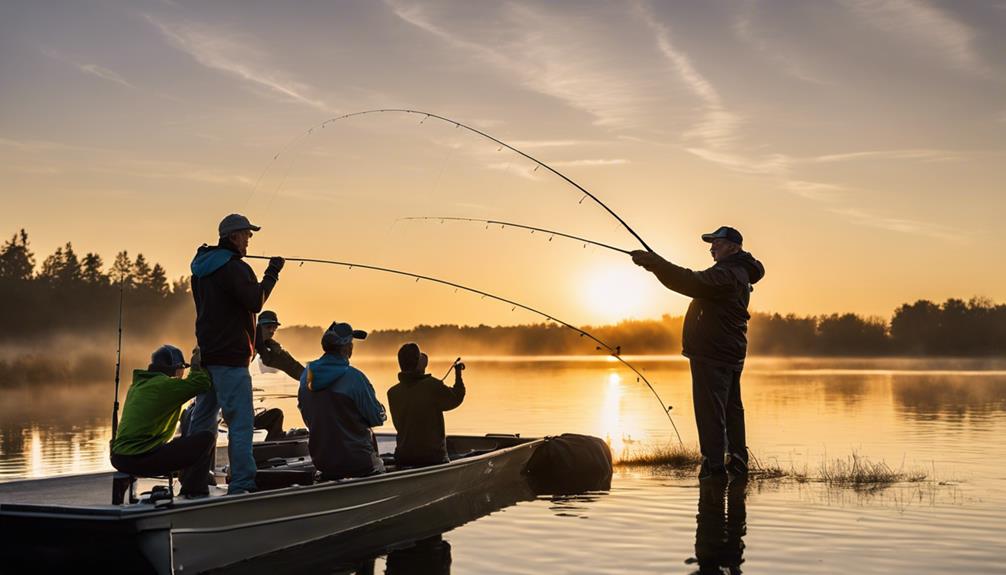
Invest in your team's physical well-being to optimize their performance in competitive angling coaching. Stamina building and agility training are essential components of enhancing physical fitness for anglers.
When it comes to stamina building, focus on exercises that improve cardiovascular endurance, such as running, swimming, or cycling. Building stamina will help your team maintain their energy levels throughout long angling tournaments, allowing them to stay focused and perform at their best until the very end.
In addition to stamina building, agility training plays a crucial role in enhancing physical fitness for competitive anglers. Agility drills like ladder drills, cone drills, and shuttle runs can help improve your team's coordination, balance, and quickness on the boat. These skills are vital for navigating rough waters, casting accurately in challenging conditions, and reacting swiftly to sudden changes in the environment.
Promoting Sportsmanship and Ethics
To foster a culture of respect and integrity among your angling team members, emphasize the importance of sportsmanship and ethics both on and off the water. Instilling these values won't only lead to a more positive team environment but also contribute to the overall growth and development of your anglers.
Tips for Promoting Sportsmanship and Ethics:
- Lead by Example: Demonstrate ethical conduct and sportsmanlike behavior in your own actions. Your team members will look to you as a role model, so it's essential to showcase the behavior you wish to see in them.
- Encourage Fair Play: Emphasize the importance of playing by the rules and respecting both fellow competitors and the environment. Cheating or unsportsmanlike behavior tarnishes the reputation of the angler and the team as a whole.
- Provide Constructive Feedback: When addressing instances where ethical conduct or sportsmanship is lacking, do so in a constructive and educational manner. Use these moments as learning opportunities to help your team members grow and develop both as anglers and as individuals.
Frequently Asked Questions
How Can Competitive Anglers Improve Their Focus and Concentration During Tournaments?
To boost focus in tournaments, try mindfulness techniques and visualization exercises. Take deep breaths and work on mental toughness strategies. Picture yourself catching that big fish and stay in the moment.
Keep distractions at bay by honing in on the task at hand. By practicing these methods consistently, you can sharpen your concentration skills and increase your chances of success in competitive angling tournaments.
What Strategies Can Coaches Use to Help Anglers Overcome Performance Anxiety?
To help anglers overcome performance anxiety, coaches can teach visualization techniques and breathing exercises. Encourage positive self-talk and reinforce successes. Set specific, achievable goals to boost confidence.
How Do Coaches Tailor Training Plans to Accommodate Individual Angler Strengths and Weaknesses?
To tailor training plans for individual anglers, coaches analyze strengths and weaknesses. They create personalized strategies to enhance performance.
By focusing on individual progress, coaches can adjust techniques to suit each angler's needs. This tailored approach maximizes the effectiveness of training sessions and helps anglers reach their full potential.
What Role Does Data Analysis Play in Improving Angler Performance?
To boost angler performance, data analysis is key. By tracking performance and using statistical analysis, coaches gain insights to enhance strategies.
Angler feedback is vital, helping coaches make tactical adjustments for better results. With data-driven decisions, strengths can be maximized, and weaknesses improved upon.
This process ensures a focused approach, leading to optimized training plans tailored to individual needs and ultimately better competitive angling outcomes.
How Do Coaches Address Conflicts and Promote Teamwork Among Competitive Anglers?
To address conflicts and promote teamwork among competitive anglers, you must first create an open line of communication. Listen actively to both sides to understand the issues. Encourage compromise and find common ground to resolve conflicts.
Organize team-building activities to foster camaraderie and trust. By promoting a positive team environment and addressing conflicts constructively, you can enhance teamwork and elevate your anglers' performance on the competitive stage.
Conclusion
In conclusion, excelling in competitive angling coaching requires a holistic approach that encompasses:
- Understanding angler psychology
- Developing customized training plans
- Implementing advanced techniques
- Utilizing technology for analysis
- Emphasizing mental preparation
- Building team cohesion
- Enhancing physical fitness
- Promoting sportsmanship and ethics
By focusing on these key areas, you can help your anglers reach their full potential and achieve success in competitive fishing tournaments.
So, keep these tips in mind and watch your coaching skills soar!
